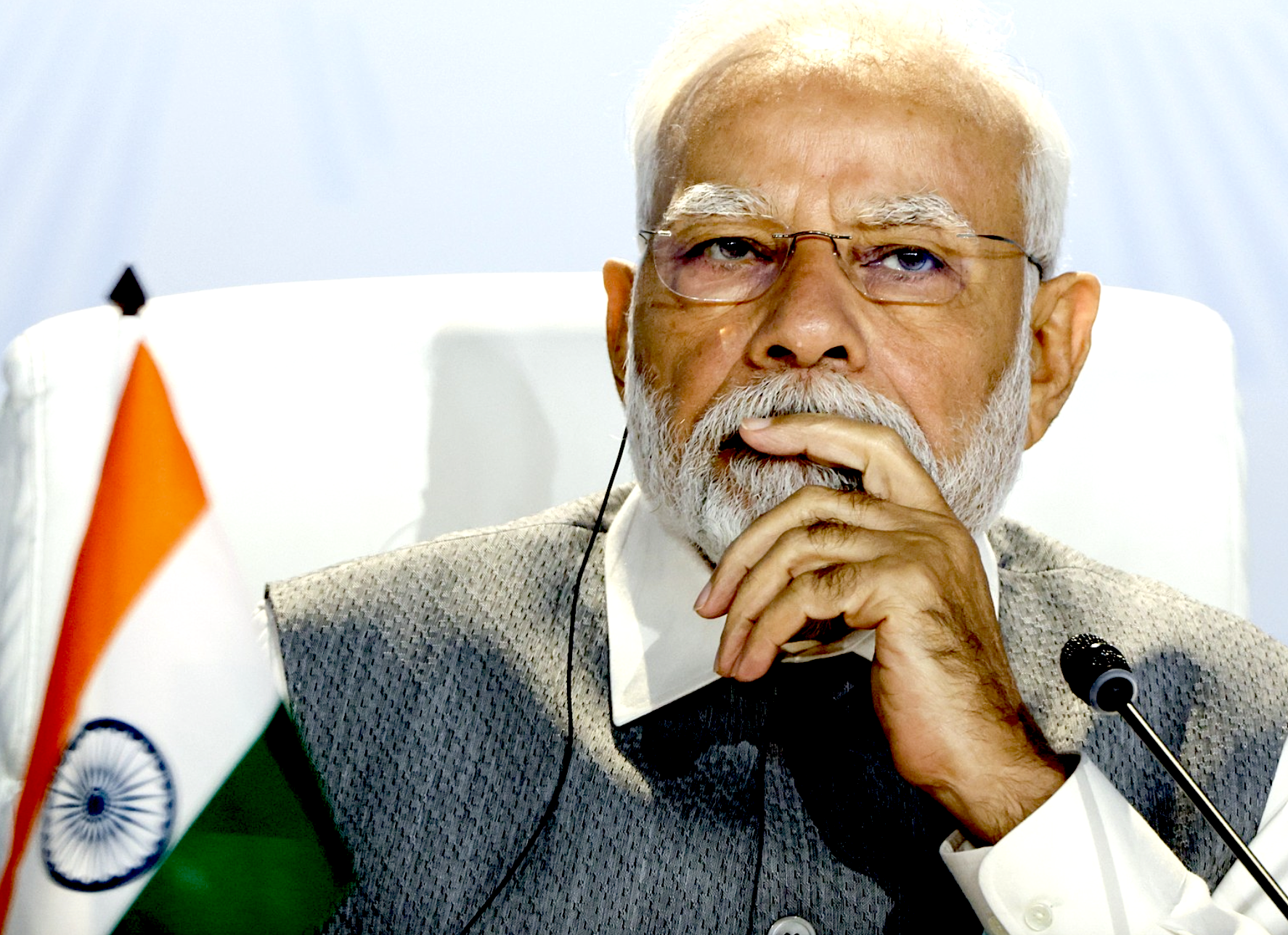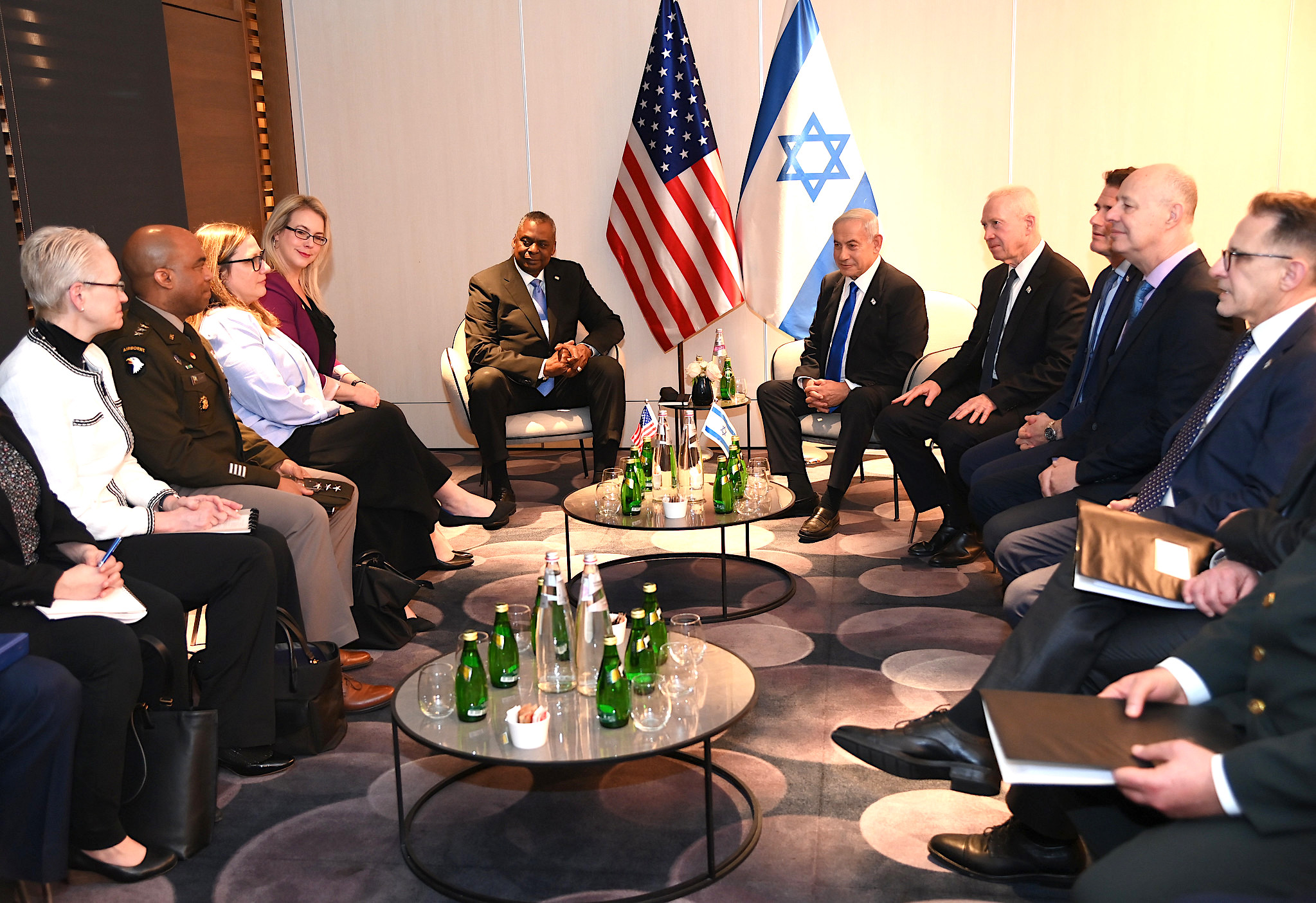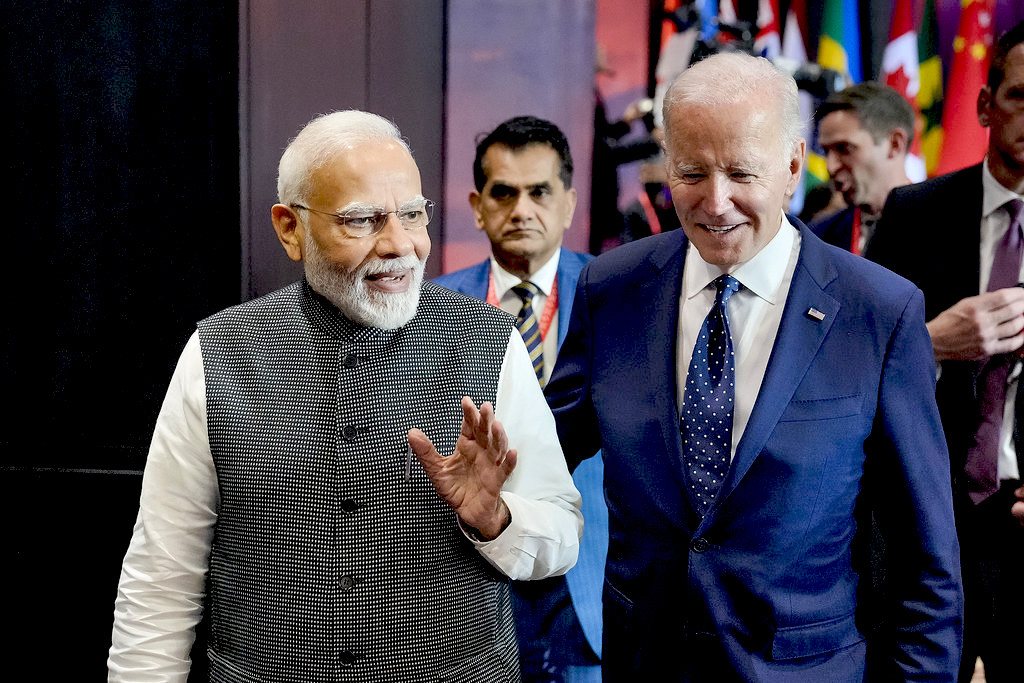Modi’s expression of support for Israel exposes the paradox of India’s claim to be the leader of the Global South, writes M.K. Bhadrakumar.

Modi on Aug. 23, during BRICS summit in Johannesburg. (Sergei Bobylev, TASS)
By M.K. Bhadrakumar
Indian Punchline
 The Indian reaction to the massive eruption of violence between Hamas and Israel on Saturday belies ground realities and ignores the geopolitical environment in that region and globally in which this cataclysmic event merits careful appraisal. It will prove to be unsustainable and can damage the country’s interests and standing globally.
The Indian reaction to the massive eruption of violence between Hamas and Israel on Saturday belies ground realities and ignores the geopolitical environment in that region and globally in which this cataclysmic event merits careful appraisal. It will prove to be unsustainable and can damage the country’s interests and standing globally.
No 1: Indian policy has blatantly tilted toward Israel. What has been a matter of speculation assumed habitation and a name when Prime Minister Narendra Modi’s tweet on Saturday underscored India’s “solidarity” with Israel.
The resonant expression signifies a historic departure from India’s consistent stance on the Palestine issue, which followed, quintessentially, the footfalls of Mahatma Gandhiji who had the prescience and vision to oppose the creation of Israel on Palestinian homelands in the cruel manner in which the Western powers imposed that geopolitical construct on West Asia.
Deeply shocked by the news of terrorist attacks in Israel. Our thoughts and prayers are with the innocent victims and their families. We stand in solidarity with Israel at this difficult hour.
— Narendra Modi (@narendramodi) October 7, 2023
What prompted this radical shift remains unclear.
No. 2: Delhi had the benefit of a “preview” of what is to follow in Gaza in the coming weeks or months. Prime Minister Benjamin Netanyahu proclaimed that the “enemy will pay an unprecedented price” and promised that Israel would “return fire of a magnitude that the enemy has not known.” He declared war on Gaza.
Netanyahu’s capacity for mindless violence is legion. Yet, Delhi rushed in to react at an emotional, subjective level.
No. 3: The possibility of a ground offensive and even occupation of Gaza is real. Simply put, India’s patented mantra that “this is not an era of wars” obliges it to mark distance from Netanyahu. But instead, it risks taking a virtual partisan position in the carnage that is to follow — politically, morally, diplomatically.
At such a crucial juncture, at the very least, the government being a “Vishwa Guru” who tirelessly propagates the notion of Vasudhaiva Kutumbakaam (The World is One Family), gets exposed, warts and all. India’s role should be of a unifier rather than divider.
No. 4: India’s reaction is clearly at odds with the sentiments of the Global South. Empathy with victims of violence is one thing, but political support for the collective West (which is what this entails, in reality, in the prevailing climate in world politics) is another thing.

U.S. Defense Secretary Lloyd Austin, on left of U.S. flag; Netanyahu in front of Israeli flag, with Israel’s Defense Minister Yoav Gallan beside him. (U.S. Embassy Jerusalem, Flickr, CC BY 2.0)
Two days after Russian President Vladimir Putin praised Modi’s India sky-high as a stellar example of a civilisation state role model in a multipolar world in a landmark speech addressing an elite audience — distinguishing it from the predatory, neo-colonial Western powers — India negated his thesis.
There is no question that the Indian stance exposes the paradox of its self-appointed claim to be the leader of the Global South. When the crunch time came, Indian elites showed their true colours.
No. 5: Israel’s reaction, now under way, is expected to be massive, unremitting and ruthless. An Israeli occupation of Gaza is a high probability, howsoever foolish that might eventually turn out to be. Israeli Defence Minister Yoav Gallant’s chilling words vowing to “change the reality in Gaza” will mean that increasingly, it will become difficult for the countries of the region and the Global South — and even the “friends of Israel” in the U.S. and Europe — to remain passive.
India has dug itself a foxhole from where it will be difficult to come out with anything but a battered reputation and credibility.
No. 6: Troubling questions arise in regard of India’s credentials to be a U.N. Security Council permanent member. Whose interests, after all, does India represent other than its self-interests? This becomes a daunting question for which there are no easy answers. Succinctly put, the fruits of decades of hard work by successive Indian leaderships and diplomats are being squandered away.
No. 7: All wars come to an end through negotiations. But this war will be a long and wide-ranging one. The wily politician in Netanyahu, who is under immense pressure domestically, facing personal legal charges and holding on to power with the help of ultra-nationalist and right-wing partners, will seize the opportunity to salvage his reputation as Israel’s great protector and rally the political and security establishment in his country, which is deeply divided, and shall be in no hurry to sit at the negotiating table with Hamas.
Donate to CN’s
Fall Fund Drive
On the other hand, the U.S. intention will be to claw its way up the greasy pole of West Asian politics after the Iran-Saudi rapprochement. In a major display of force, a vast armada of warships and planes is slouching toward East Mediterranean. How this force projection will pan out remains to be seen.
The temptation will be there to reimpose U.S. hegemony in West Asia and to project U.S. President Joe Biden as a decisive leader at a time when, on the one hand, his re-election bid in the 2024 election is wide open and, on the other hand, the spectre of a humiliating defeat in Ukraine haunts his presidency.

Modi with Biden at the G20 summit in November 2022, in Bali, Indonesia. (White House/Adam Schultz)
The political interests of Biden and Netanyahu are coalescing and the stench of Israel’s war may engulf other countries in the region as time passes. The Indian leadership will be hard-pressed to demonstrate its friendship and bonhomie with Netanyahu in an apocalyptic scenario.
No. 8: The Modi government might as well say goodbye to the grand idea of building an Indo-Arab economic corridor to Europe in a foreseeable future. That means, Haifa Port, which was acquired by the Adani Group in a “strategic purchase” at a reported cost of $1.13 billion with Netanyahu’s blessing, will be underperforming. Smart economic diplomacy entailed fostering Arab-Israeli amity.
The hugely ambitious India-Middle East-Europe Economic Corridor (IMEC) multi-modal trade route is already beginning to encounter resistance just weeks after being announced at the G20 leaders summit in New Delhi. https://t.co/Dtfg44jjo5
— The China-Global South Project (@ChinaGSProject) October 1, 2023
No. 9: The Indian government has blithely ignored that Israel is a state sponsoring terrorism. Optics matter in politics and international affairs, and at a time when India’s own credentials are under Western scrutiny, it is doubly important that it is careful in its words and behaviour. There is an old saying, “Show me your friends and I will show you your future!” If the intention is to fly on the wings of the Israeli lobby in North America — or to catch Biden’s eye — it smacks of naïveté, to say the least.

Hamas’ 25th anniversary celebrated in Gaza, Dec. 8, 2012. (Fars Media Corporation, Wikimedia Commons, CC BY 4.0)
No. 10: Finally, India should know that in the final analysis, sins are forgotten and forgiven when a political movement with violence in its toolbox commands the overwhelming support of the masses. Indeed, that is how it should be. By that yardstick, Hamas passed the litmus test decades ago, much before the BJP formed a government in 2014.
Hamas today is the unquestioned leader of Palestinian aspirations, towering head and shoulders above peer groups and is a mainstream interlocutor for the regional powers. It even has a representative office in Moscow. Clearly, the Indian reaction, which tends to view the current development as a “stand alone” event of terrorism, is anachronistic.
An enduring Palestinian settlement will have to be inclusive and will include Hamas after the audacity of hope it has displayed. The BJP leadership should educate its provincial leaders with tunnel vision on international affairs that Islamism is not to be equated with terrorism in the global commons, especially the politics of the Muslim Brotherhood to which Hamas belongs.
M.K. Bhadrakumar is a former diplomat. He was India’s ambassador to Uzbekistan and Turkey. Views are personal.
This article originally appeared on Indian Punchline.
The views expressed are solely those of the author and may or may not reflect those of Consortium News.
Donate to CN’s
Fall Fund Drive



The root cause of the persecution of Palestinians is Israeli racism. Does Modi believe that this same kind of racism will never be turned towards Indians?
Modi may be rightly or wrongly seen as an idiot but he certainly is no lunatic. He fully knows that is a possibilty but it is only in the distant horizon ; meanwhile India is free to quite friendly milk Israel for all its worldly worth !
If Modi needs a Master Class I suggest he listen to Alastair Crooke in the Duran.
You could not have got it more RIGHT. Like Narayan 3 India has gone to sleep on the job.
When you read ARUNDHATI ROY and the atrocities under Modi, you can see how Modi and Netty are alike. Modi is doing no less to the Muslim populations of India. I don’t know why no one blames the Brits or those who were responsible for dividing the Ottoman Empire but they sure didn’t know shit about the religions or cultures of the area.
I concur 100%.
Bhadrakumar’s principled comments on the Gaza situation are welcome, but I doubt whether Modi will rethink his gushing support of Netanyahu/Israel regarding Palestine, nor will the BJP ever “educate” provincial members about the form of “Islamism” as practiced by Hamas.
(Hamas, by the way, severed its ties to the Muslim Brotherhood at conference in Qatar in 2017 and modified its position toward Israel to be against Zionism and the Occupation, not the Israeli people. Mondoweiss articles have covered this.)
Modi’s cozy ties with Israel are not a recent departure from India’s traditional policy but have been cultivated ever since he became PM in 2014. Indeed, he and Bharatiya Janata Party (BJP) have benefited from immensely from this alliance, especially in courting India’s tech and management professionals, who tend to be strongly pro-Israel.
Israel cooperates closely with India areas of defense, homeland security, and intelligence. Israeli media writes about this at length. Also, Israel’s model of ‘divide & rule’ politics has served Modi and the BJP well in whipping up populist mania against religious minorities and such areas as Kashmir.
Will this dampen Modi’s standing in the BRICS alliance? Probably not, at least for the short term. As for the long term, we can only hope that a new multipolar world will lead to less division and animosity.
Search ARUNDHATI ROY, “The dismantling of Democracy in India will affect the whole world,” a recent speech accepting 2023 European Essay Award from the Charles Veillon Foundation.
Am I missing something here?
I don’t know why there should be any surprise over Modi’s stance – after all, he has helped orchestrate his own anti-Muslim pogrom in India – he and Benny are birds of a feather, both vultures …
It is essential to understand that Hindu antipathy towards Islam is, if not as repugnant as that espoused by Zionists, still blatant, a residue of India’s stark cultural divide. It is what renders American civic activist Tulsi Gabbard much less credible as her obvious Islamophobia impacts her credibility as a progressive peace activist. It is why, although I share many of her policy goals, I would never again support her as a potential presidential candidate.
This provides a lesson that probably must be repeated over and over.
A multipolar world is a better and more nearly just arrangement than unipolar hegemony, but not because the nominal leaders of the various poles are innocent or benign. It is meet that peoples oppressed by relations between nations find representation, but it is not necessarily the case that such peoples are represented by their own governments. This is true both of national governments and of elements within any single society.
Americans long spoke of the passing of European empire and hegemony. But what came out of the two world wars was American participation in and direction of that power, not American disassembly of it. The United States was not friendlier to wars of liberation than had been the British or the French or other European empires before it just because it had once been a set of British colonies.
Similarly, Modi’s concern is not for people squashed by the Israeli extension of Western empire. Modi’s concern is more that powerful and influential people within India have control over Indian affairs, that they need not cede such control to the likes of London or Washington or other foreign players–nor, for that matter, that his allies among them need cede part of their power to other Indians.
Where does this leave us?
Still better with a multipolar structure, surely, but with considerable work to do.
Indian curry-favouring in West Asia should have been wisely restricted to just Curry-dancing across that madly Bollywood swayed region but moody Modi swung idiotically to Kali-dance instead with India’s not too secret bed mate, Israel at the Levant. Bhadrakumar must be lauded for being bluntly objective and to stand up to India’s nonsense despite himself being a proud Indian. If all Indians can learn to be non-hypocritical like him India would easily become the natural leader of the Global South and also secure a peaceful South Asia too. But no such luck coming anytime soon given the overly Zio-Con bias of most Indian elites !